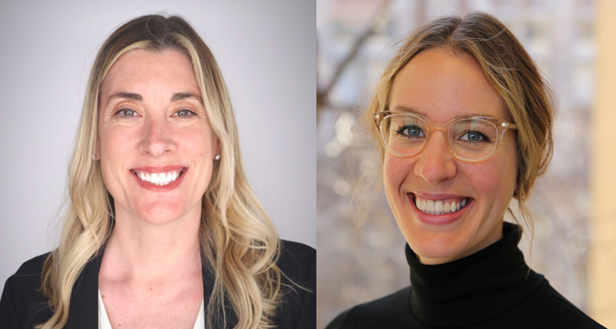The Nashville Partnership for Educational Equity Research is a collaboration between Metro Nashville Public Schools and Vanderbilt Peabody College of education and human development. To improve equity across MNPS, PEER brings together researchers and practitioners to collaborate in long-term working groups and short-term rapid response teams. Watch the video above to learn more from some of PEER’s working group members and why they decided to join PEER. In the following Q&A, their sentiments are shared by PEER’s co-directors, Erin Henrick, MEd’03, EdD’07, and Abbey Loehr, MS’15, PhD’18.
Henrick, assistant professor of the practice of leadership, policy, and organizations, became the Vanderbilt co-director of PEER earlier this year. She assumed the role following the tenure of Marcy Singer-Gabella, a former professor of the practice of education and PEER’s inaugural Vanderbilt director. Loehr, MNPS’ co-director and manager of research-practice partnerships at the school district, began her role in 2023 following the tenure of Caroline Marks. Together, Henrick and Loehr aim to advance the work of their predecessors, focusing on PEER’s infrastructure, growth and sustainability, so that its research-practice partnership teams can continue to improve equity outcomes across MNPS.

Describe the importance of equity in PEER in terms of both outcomes and the collaborative process.
Loehr: We must understand existing inequities and disparities so that we can work toward the longer-term goal of disrupting inequitable systems, which is incredibly challenging and complex work. PEER is committed to understanding the experiences of those closest to the problem, listening to students, teachers, and counselors, understanding their experiences and thinking about—not just academic outcomes—but also the quality of students’ experiences at school.
When we focus on the longstanding history that perpetuates inequities and on disrupting and challenging inequitable systems, what we’re really doing is pushing the city of Nashville to hold collective accountability for the well-being of kids while also ensuring that the district is doing everything in its power to eliminate inequities for students.
Henrick: Equity is also embedded in the working processes of the PEER collaborative teams from the very beginning, from settling on a research question to thinking about the study design and protocol development, and all the different phases where it would be useful to have different voices. It’s about ensuring that all relevant community members are a part of the conversation.
Why did you decided to become PEER directors, and what does your work entail?
Loehr: I’m a huge advocate for PEER and saw it as an exciting opportunity to affect change through collaborative research. I believe in our goal of pursuing educational equity for our students.
As directors, we build relationships and connections between people with the right expertise and experience. I’m also seeking information across all the departments and levels of the district to connect people with resources, remove barriers, and identify whatever is needed to help move research and action forward.
Henrick: A long time ago, I named myself a research-practice partnership enthusiast. To me, education RPPs are the most equitable and humanizing approach to use research to make a difference for young people in our community, so I am incredibly honored to be a part of PEER.
My research focuses on understanding how to bring together researchers, practitioners, and community members into productive collaborations. At PEER, we engage in a lot of strategic planning because we’re committed to this being a longstanding partnership that continues to grow and to strengthen the relationship between MNPS and Peabody. We work to figure out the structures and processes needed to make PEER successful and mutually beneficial to everyone involved.
What are your goals as PEER’s new co-directors? How do you work in partnership to lead PEER?
Henrick: Our goal is to collectively ensure that PEER’s mission is successful. To do that, we are extremely collaborative. Abbey and I meet regularly, and we meet with a steering committee each semester. District leaders meet every two weeks. We want to ensure we understand and address challenges, build new structures, and effectively lead across both organizations.
Loehr: Marcy would always say, we’re through the infancy period of the partnership, and we’re now toddlers, so our sustainability plan is key. We’re growing, which is exciting, but that means we’re focused on the supports we need to sustain our growth. Transparency is also core to how Erin and I work in partnership to lead PEER.
What makes PEER unique?
Loehr: A district co-director is something that few other RPPs have. That plays a significant role in how PEER operates and what we’re able to accomplish.
Henrick: A lot of time and thoughtfulness went into launching PEER. It was intentionally designed to engage top MNPS leadership. For example, we have regular cabinet meetings where PEER holds learning discussions around research and implications. In a lot of partnerships, such opportunities are much more limited, or people most closely involved in the partnership might be in only one department. PEER includes members across all the different MNPS systems.
What do you value most about PEER?
Loehr: I value the deep engagement from everyone involved in PEER and the dedication and passion from both sides. I also value the autonomy granted to Erin and me and the trust placed in us to lead PEER.
Henrick: I completely agree. The time and energy it took to get the partnership off the ground has built a whole group of PEER supporters who are committed to its success. Both sides bring so much expertise, and because of that, we can accomplish a lot together.
Loehr: We are also both grateful to the founding co-directors, Marcy Singer-Gabella and Caroline Marks, Dean Camilla Benbow and Dr. Adrienne Battle, as well as all the researchers, district leaders, school leaders, and everyone who participates and believes in PEER.